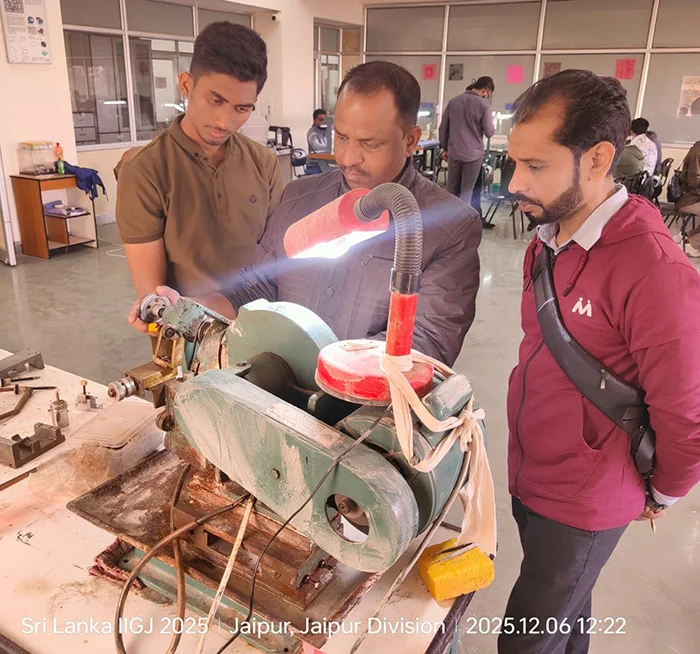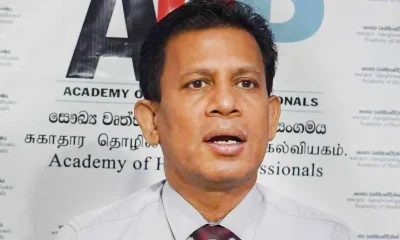Business
Pathfinder and Vivekananda Foundation focus on relations between India and Sri Lanka

The Pathfinder Foundation (PF) and Vivekananda International Foundation (VIF), a leading think tank in India, conducted a webinar with virtual participation of several experts from both countries on the themes ‘Regional and Geopolitical Environment’ and ‘Indo-Lanka Trade & Economic Relations’.
The two delegations were headed by Bernard Goonetilleke, Chairman, Pathfinder Foundation and Dr. Arvind Gupta, Director-Vivekananda International Foundation. Dr. Indrajit Coomaraswamy, Former Governor of the Central Bank of Sri Lanka and Sanjay Chadha, Additional Secretary, Ministry of Commerce and Industry of India addressed the subject of Indo-Lanka trade and economic relations, whilst Admiral (Prof.) Jayanath Colombage, Secretary-Ministry of Foreign Affairs and Anil Wadhwa, former Secretary (East) in the Ministry of External Affairs of India provided their personal perspectives on regional geopolitics.
During the session on trade and economic relations, given the dynamics of geopolitics in the Indian Ocean Region, the need for a rules-based framework following the principle of non-reciprocity in the interest of a smaller economies within an asymmetric system was brought forth. Increasing people-to-people contacts taking advantage of the island’s close proximity to South India and the number of favourable factors existing to build a good foundation for trade between the two countries was stressed on. The Indo Lanka Free Trade Agreement of 2000 was also discussed with its unrealized potential as well as impediments. Export, investment, training and technology transfer, creation of special economic zones, improvement in connectivity and logistics and electrical grid connectivity were pointed out as areas to focus on for enhancing economic relations between the two nations. It was noted that Indian investment in the island has increased considerably during the past few years, whilst Sri Lankan businesses too have begun operations in India. The Economic and Technology Co-operation Agreement (ETCA) that seeks to add to the existing free trade agreement between the two nations was noted as a positive venture for both parties after necessary refinement. The discussion that followed brought out concerns related to public mistrust of the free trade agreements in general and how to overcome this issue by increasing transparency. The fisheries issue in the Palk Strait area that adversely affect bilateral relations and economic interests of the island was considered as an issue that need to be resolved through determined action and negotiation.
The session on the regional geopolitical environment focused on how the Covid-19 pandemic has created a new world order where Sri Lanka, although a smaller nation, has been successful is meeting challenges. In an environment where the role of international organizations such as the WHO are questioned, two new specific areas have emerged – food security and medical security. In this respect, attention was drawn to the fact that India gifted large quantities of medical supplies, which has led to a novel phenomenon of ‘health diplomacy’. The Sri Lankan public’s tendency to mistrust its larger neighbour was considered as the principal obstacle to improving relations between the neighbouring countries.
The mistrust coupled with prevailing ignorance of each other has prevented better understanding between the populations of the two countries. The meeting also focused its attention on the importance of the Indian Ocean for global economic wellbeing and discussed aspects relating to militarization of the Indian Ocean.
Business
Real economic data isn’t in a report: It’s on a bargain table

If you want to understand Sri Lanka’s economy, don’t start with reports from the Ministry of Finance or the Central Bank. Go instead to a crowded clothing sale on the outskirts of Colombo.
In places like Nugegoda, Nawala, and Maharagama, temporary year-end sales have sprung up everywhere. They draw large crowds – not just bargain hunters, but families carefully planning every rupee. People arrive with SMS alerts on their phones and fixed budgets in their minds. This is not casual shopping. It is a public display of resilience, a tableau of how people are coping.
Tables are set up in parking lots and open halls, clothes spilling from cardboard boxes. When new stock arrives, hands reach in immediately – young and old, men and women – searching for the right size, the least faded colour, the smallest flaw that justifies the price. Everyone is heard negotiating, not with desperation, but with a quiet, shared dignity.
“Look at the prices in the malls, then look here,” says a middle-aged mother shopping for school uniforms in Maharagama. “This isn’t shopping for enjoyment. This is about managing life.” Food prices have already stretched her household budget thin. Here, she can buy trousers for half the usual price.
Women, often the household’s purchasing managers, move with determined efficiency. Men are just as involved – checking stiches, comparing prices, trying shirts over their own clothes. Inflation, here, wears the same face on everyone.
Bright banners promise “Trendy Styles!”, but most shoppers know better. These are last season’s clothes, cleared out to make room for next year’s stock. Still, no one feels embarrassment. “New” now simply means something you didn’t own before; the label matters far less than the price.
Not all items are discounted equally. Essentials – work trousers, denims, track pants – are only slightly cheaper. Sellers know these will sell regardless. The steepest discounts are reserved for the items people can almost afford to skip.
This is economic data you won’t find in official reports. Here, inflation is measured in real time. A young man studies a shirt’s price tag and calculates how many days of work it represents. Friends debate whether a slight fade is a fair trade for the price. Every transaction is a careful calculation.
Year-end sales have always existed. But since the economic crisis, they have taken on a new, grim significance. They offer a slight reprieve to households learning to steadily lower their aspirations. While the government speaks of fiscal discipline and a steady Treasury, everyday life remains a tightrope walk.
The Central Bank measures inflation in percentages. On the streets of Kiribathgoda, it is measured in trade-offs: one item instead of two; buying now or waiting for the Avurudu season; choosing need over want, again and again.
As evening falls, the crowds thin. The tables are left rumpled, hangers scattered like fallen leaves. Yet these spaces tell a story more powerful than any quarterly report – a story of business ingenuity, household struggle, and an economy where every single purchase is weighed with immense care.
In that careful weighing lies a quiet, unsettling truth. No matter what is said about replenished reserves or balanced budgets, these bargain tables – if they could speak – would tell the nation’s most heart-rending story. And they do, to anyone who chooses to listen.
By Sanath Nanayakkare
Business
Global economy poised for growth in 2026, says Goldman Sachs, despite uneven job recovery

The global economy is forecast to expand by a “sturdy” 2.8% in 2026, exceeding consensus expectations, according to the latest Macro Outlook report from Goldman Sachs Research. This optimistic projection highlights a resilient recovery trajectory across major economies, albeit with significant regional variations and a persistent disconnect with labour market strength.
Goldman Sachs economists are most bullish on the United States, expecting GDP growth to accelerate to 2.6%, substantially above consensus estimates. This optimism stems from anticipated tax cuts, easier financial conditions, and a reduced economic drag from tariffs. The report notes that consumers will receive approximately an extra $100 billion in tax refunds in the first half of next year, providing a front-loaded stimulus. A rebound from the past government shutdown is also expected to contribute to what chief economist Jan Hatzius predicts will be “especially strong GDP growth in the first half” of 2026.
China’s economy is projected to grow by 4.8%, underpinned by robust manufacturing and export performance. However, economists caution that parts of the domestic economy continue to show weakness. In the euro area, growth is forecast at a modest 1.3%, supported by fiscal stimulus in Germany and strong growth in Spain, despite the region’s longer-term structural challenges.
A key concern outlined in the report is the stagnant global labour market. Job growth across all major developed economies has fallen well below pre-pandemic 2019 rates. Hatzius links this weakness partly to a sharp downturn in immigration, which has slowed labour force growth, with the disconnect being most pronounced in the United States.
While artificial intelligence (AI) dominates technological discourse, Goldman Sachs economists believe its broad productivity benefits across the wider economy are still several years away, with impacts so far largely confined to the tech sector.
Business
India trains Sri Lankan gem and jewellery artisans in landmark capacity-building programme

A 20-member delegation of professionals from Sri Lanka’s Gem and Jewellery sector visited India from 1–20 December 2025 to participate in a specialised Training and Capacity Building Programme. The delegation represented the gemstone cutting and polishing segments of Sri Lanka’s Gem and Jewellery industry.
The programme was organised pursuant to the announcement made by Prime Minister of India, Narendra Modi, during his visit to Sri Lanka in April 2025, under which India committed to offering 700 customised training slots annually for Sri Lankan professionals as part of ongoing bilateral capacity-building cooperation.
The 20-day training programme was conducted by the Government of India at the Indian Institute of Gem & Jewellery, Jaipur, Rajasthan. The curriculum comprised a comprehensive set of technical and thematic sessions covering the entire Gem and Jewellery value chain. Key modules included cleaving and sawing, pre-forming, shaping, cutting and faceting, polishing, quality assessment, and industry interactions, aimed at strengthening practical skills and enhancing design and production capabilities.
As part of the experiential learning component, the participants undertook site visits to leading gemstone manufacturing units, gaining first-hand exposure to contemporary production technologies, design development processes, and modern retail practices within India’s Gem and Jewellery ecosystem.
The specialised training programme contributed meaningfully to strengthening professional competencies, promoting knowledge exchange, and deepening institutional and industry linkages in the Gem and Jewellery sector between India and Sri Lanka, reflecting the continued commitment of both countries to capacity building and people-centric economic cooperation.
-

 News6 days ago
News6 days agoMembers of Lankan Community in Washington D.C. donates to ‘Rebuilding Sri Lanka’ Flood Relief Fund
-

 News4 days ago
News4 days agoBritish MP calls on Foreign Secretary to expand sanction package against ‘Sri Lankan war criminals’
-

 Features6 days ago
Features6 days agoGeneral education reforms: What about language and ethnicity?
-

 News6 days ago
News6 days agoSuspension of Indian drug part of cover-up by NMRA: Academy of Health Professionals
-

 Sports4 days ago
Sports4 days agoChief selector’s remarks disappointing says Mickey Arthur
-

 News3 days ago
News3 days agoStreet vendors banned from Kandy City
-

 Editorial6 days ago
Editorial6 days agoA very sad day for the rule of law
-

 News6 days ago
News6 days agoUS Ambassador to Sri Lanka among 29 career diplomats recalled













